-
 Bitcoin
Bitcoin $90,752.5471
4.27% -
 Ethereum
Ethereum $1,688.3053
6.41% -
 Tether USDt
Tether USDt $1.0006
0.08% -
 XRP
XRP $2.1453
3.23% -
 BNB
BNB $607.1447
1.71% -
 Solana
Solana $144.2444
7.14% -
 USDC
USDC $0.9997
-0.01% -
 Dogecoin
Dogecoin $0.1703
8.31% -
 TRON
TRON $0.2467
1.46% -
 Cardano
Cardano $0.6557
5.58% -
 Chainlink
Chainlink $13.7511
5.08% -
 Avalanche
Avalanche $21.5976
7.79% -
 UNUS SED LEO
UNUS SED LEO $8.9863
-1.47% -
 Stellar
Stellar $0.2566
1.55% -
 Sui
Sui $2.3975
10.43% -
 Shiba Inu
Shiba Inu $0.0...01300
5.63% -
 Toncoin
Toncoin $2.9806
2.64% -
 Hedera
Hedera $0.1760
4.31% -
 Bitcoin Cash
Bitcoin Cash $355.4488
3.40% -
 Litecoin
Litecoin $82.9174
5.86% -
 Hyperliquid
Hyperliquid $18.6132
6.14% -
 Polkadot
Polkadot $3.8737
1.18% -
 Dai
Dai $0.9998
0.01% -
 Bitget Token
Bitget Token $4.5191
1.97% -
 Ethena USDe
Ethena USDe $0.9996
0.04% -
 Pi
Pi $0.6386
1.01% -
 Monero
Monero $220.4697
3.17% -
 Pepe
Pepe $0.0...08356
7.90% -
 Uniswap
Uniswap $5.5839
5.52% -
 Aptos
Aptos $5.0800
1.52%
What is the difference between the account model and the UTXO model in a blockchain?
Blockchain tech uses Account Model for easy state changes, seen in Ethereum, and UTXO Model for privacy, used by Bitcoin, affecting transaction processing and scalability.
Apr 12, 2025 at 04:00 pm

The blockchain technology underpinning cryptocurrencies like Bitcoin and Ethereum can be implemented using different data models, primarily the Account Model and the UTXO Model. These models dictate how transactions are processed and how balances are managed on the blockchain. Understanding the differences between these two models is crucial for anyone involved in the cryptocurrency space, as they affect everything from transaction processing to privacy and scalability.
What is the Account Model?
The Account Model is a straightforward approach to managing balances on a blockchain, similar to traditional banking systems. In this model, each user has an account that maintains a balance. When a transaction occurs, the balance of the sender's account is debited, and the balance of the recipient's account is credited.
- Example: If Alice wants to send 1 ETH to Bob, her account balance is reduced by 1 ETH, and Bob's account balance is increased by 1 ETH.
This model is used by Ethereum and many other smart contract platforms. It simplifies the process of managing complex state changes, making it ideal for platforms that require frequent state updates and smart contract executions.
What is the UTXO Model?
The UTXO Model, or Unspent Transaction Output Model, is used by Bitcoin and other similar cryptocurrencies. In this model, transactions are not directly linked to accounts but rather to specific outputs from previous transactions. Each transaction consumes one or more UTXOs and creates new UTXOs.
- Example: If Alice wants to send 1 BTC to Bob, she must use one or more UTXOs that sum up to at least 1 BTC. If she uses a UTXO worth 2 BTC, she will create a new UTXO of 1 BTC for Bob and another UTXO of 1 BTC as change back to herself.
This model provides a high level of privacy and security, as each transaction is independent and does not directly reference the sender's total balance.
Key Differences Between the Account Model and the UTXO Model
Transaction Processing
In the Account Model, transactions are processed by directly updating the balances of the involved accounts. This makes it easier to implement complex operations and smart contracts, as the state of the blockchain can be easily modified.
In contrast, the UTXO Model requires transactions to reference specific UTXOs. This can make transaction processing more complex, but it also provides a clear audit trail and enhances privacy, as the total balance of an address is not directly visible.
Privacy and Security
The Account Model can be less private, as the balance of an account is directly visible on the blockchain. This can make it easier for third parties to track the financial activities of users.
The UTXO Model offers better privacy, as each transaction is independent and does not reveal the total balance of an address. This makes it more difficult to track the financial activities of users, enhancing security and privacy.
Scalability
The Account Model can be more scalable for certain types of operations, particularly those involving smart contracts and frequent state updates. However, it can also lead to increased complexity and potential vulnerabilities in the smart contract code.
The UTXO Model can be more scalable for simple transactions, as each transaction is independent and does not require updating the state of the entire blockchain. However, it can be less efficient for complex operations and smart contracts.
Implementation and Use Cases
The Account Model is commonly used in platforms that require complex state management and smart contract execution, such as Ethereum. It is well-suited for decentralized applications (dApps) and other use cases that require frequent state updates.
The UTXO Model is used in platforms that prioritize privacy and security, such as Bitcoin. It is well-suited for cryptocurrencies that focus on simple transactions and do not require complex state management.
Practical Examples of the Account Model and the UTXO Model
To better understand how these models work in practice, let's look at some examples.
Example of the Account Model
- Scenario: Alice wants to send 1 ETH to Bob on the Ethereum network.
- Step-by-Step Process:
- Alice initiates a transaction to send 1 ETH to Bob.
- The Ethereum network processes the transaction by debiting Alice's account by 1 ETH and crediting Bob's account by 1 ETH.
- The transaction is recorded on the blockchain, and the balances of both accounts are updated.
Example of the UTXO Model
- Scenario: Alice wants to send 1 BTC to Bob on the Bitcoin network.
- Step-by-Step Process:
- Alice identifies a UTXO worth 2 BTC in her wallet.
- She creates a transaction that consumes the 2 BTC UTXO and creates two new UTXOs: one worth 1 BTC for Bob and another worth 1 BTC as change back to herself.
- The transaction is broadcast to the Bitcoin network and verified by nodes.
- Once verified, the transaction is added to the blockchain, and the new UTXOs are created.
Advantages and Disadvantages of Each Model
Advantages of the Account Model
- Simpler State Management: The account model simplifies the process of managing complex state changes, making it ideal for platforms that require frequent state updates and smart contract executions.
- Easier to Implement Smart Contracts: The account model is well-suited for implementing smart contracts, as it allows for direct manipulation of account balances and other state variables.
Disadvantages of the Account Model
- Lower Privacy: The account model can be less private, as the balance of an account is directly visible on the blockchain.
- Potential Vulnerabilities: The account model can be more vulnerable to smart contract bugs and other security issues, as it involves direct manipulation of account balances and other state variables.
Advantages of the UTXO Model
- Higher Privacy: The UTXO model offers better privacy, as each transaction is independent and does not reveal the total balance of an address.
- Clear Audit Trail: The UTXO model provides a clear audit trail, as each transaction references specific UTXOs and creates new UTXOs.
Disadvantages of the UTXO Model
- More Complex Transaction Processing: The UTXO model can make transaction processing more complex, as each transaction must reference specific UTXOs and create new UTXOs.
- Less Efficient for Complex Operations: The UTXO model can be less efficient for complex operations and smart contracts, as it requires managing multiple UTXOs and creating new UTXOs for each transaction.
Frequently Asked Questions
Q: Can a blockchain switch from one model to another?
A: While it is theoretically possible to switch from one model to another, it would require significant changes to the underlying protocol and could be extremely challenging to implement in practice. Most blockchains are designed with a specific model in mind, and switching models would require a hard fork and consensus among the network participants.
Q: Are there any hybrid models that combine elements of both the account model and the UTXO model?
A: Yes, some blockchains use hybrid models that combine elements of both the account model and the UTXO model. For example, some platforms use the UTXO model for simple transactions and the account model for smart contract execution. These hybrid models aim to leverage the advantages of both models while mitigating their disadvantages.
Q: How does the choice of model affect the user experience?
A: The choice of model can significantly affect the user experience. The account model can provide a more familiar and user-friendly experience, as it is similar to traditional banking systems. The UTXO model can be more complex for users to understand and manage, but it can also provide a higher level of privacy and security. Ultimately, the choice of model depends on the specific use case and the priorities of the blockchain platform.
Q: Can the UTXO model be used for smart contracts?
A: While the UTXO model is less commonly used for smart contracts, it is possible to implement smart contracts using the UTXO model. For example, Bitcoin's scripting language allows for basic smart contract functionality, and some platforms like Cardano use the UTXO model for more advanced smart contract execution. However, the account model is generally more suited for complex smart contract operations due to its simpler state management.
Disclaimer:info@kdj.com
The information provided is not trading advice. kdj.com does not assume any responsibility for any investments made based on the information provided in this article. Cryptocurrencies are highly volatile and it is highly recommended that you invest with caution after thorough research!
If you believe that the content used on this website infringes your copyright, please contact us immediately (info@kdj.com) and we will delete it promptly.
- Bitcoin (BTC) Price Surges to Two-Week High, Breaking Above $90,000
- 2025-04-23 01:00:12
- Popcat (POP) Price Soars Over 20% As Investors Rush To Buy The Meme Coin
- 2025-04-23 01:00:12
- Bitcoin (BTC) hits six-week highs as US trade war tensions embolden crypto bulls
- 2025-04-23 00:55:12
- An Encouraging Situation for Polygon
- 2025-04-23 00:55:12
- The European Central Bank (ECB) is the alarm about President Trump's policy
- 2025-04-23 00:50:12
- SUBBD Token Aims to Disrupt the $85000000000 Content Creation Market by Targeting OnlyFans
- 2025-04-23 00:50:12
Related knowledge
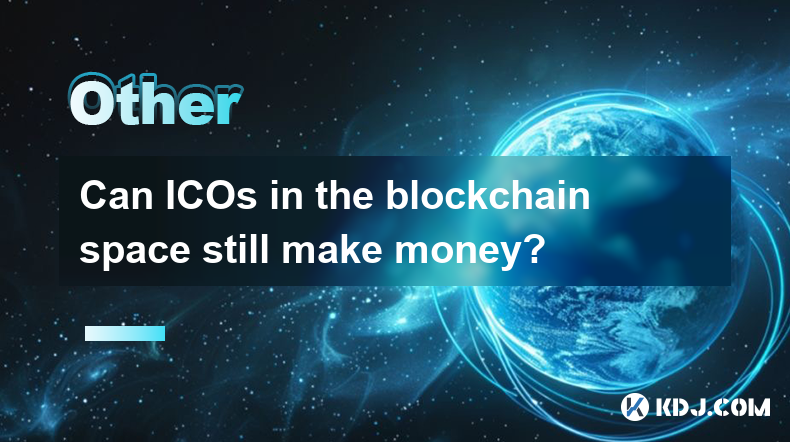
Can ICOs in the blockchain space still make money?
Apr 17,2025 at 08:29pm
The landscape of Initial Coin Offerings (ICOs) in the blockchain space has evolved significantly since their peak in 2017 and 2018. Despite the increased regulatory scrutiny and the rise of alternative fundraising methods like Security Token Offerings (STOs) and Initial Exchange Offerings (IEOs), ICOs can still be a viable way to raise funds and generat...
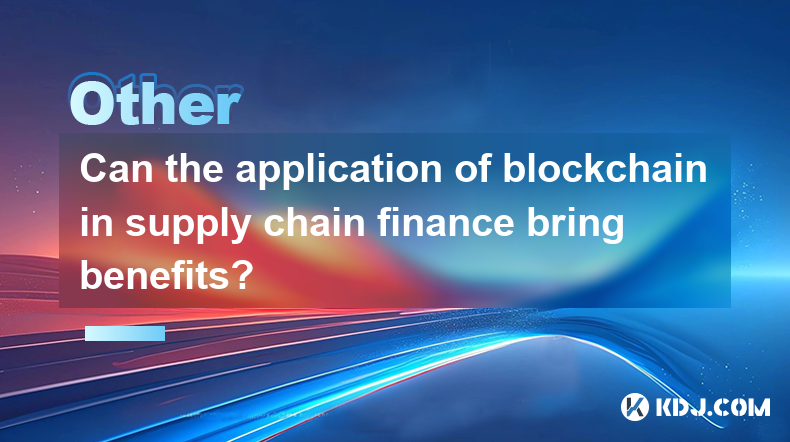
Can the application of blockchain in supply chain finance bring benefits?
Apr 15,2025 at 04:00pm
Can the application of blockchain in supply chain finance bring benefits? The integration of blockchain technology into supply chain finance has garnered significant attention in the cryptocurrency and financial sectors. This article explores how blockchain can potentially revolutionize supply chain finance, detailing its benefits and providing a compre...

Does the ranking of Chinese blockchain apps include cross-chain applications?
Apr 14,2025 at 04:00pm
The ranking of Chinese blockchain apps is a comprehensive evaluation that takes into account various aspects such as user base, transaction volume, and technological innovation. A pertinent question arises regarding whether these rankings include cross-chain applications. Cross-chain applications, which allow different blockchain networks to interact an...
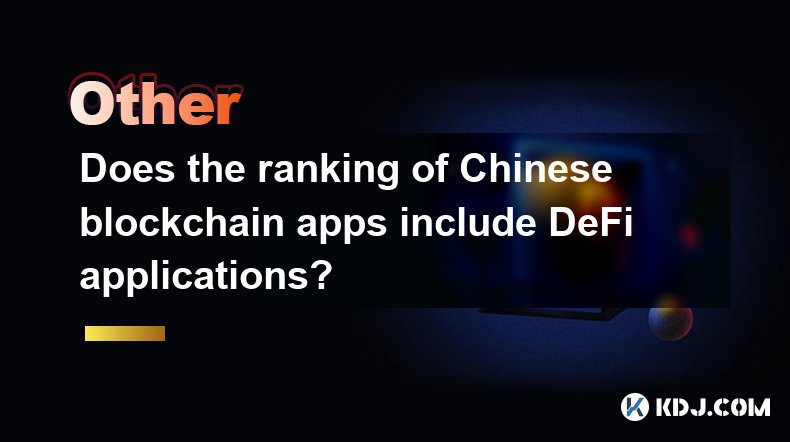
Does the ranking of Chinese blockchain apps include DeFi applications?
Apr 15,2025 at 06:57am
The ranking of Chinese blockchain apps is a comprehensive list that showcases the most popular and influential applications within the cryptocurrency ecosystem. One question that often arises is whether these rankings include DeFi applications. To answer this, we need to delve into the specifics of how these rankings are compiled and what types of appli...
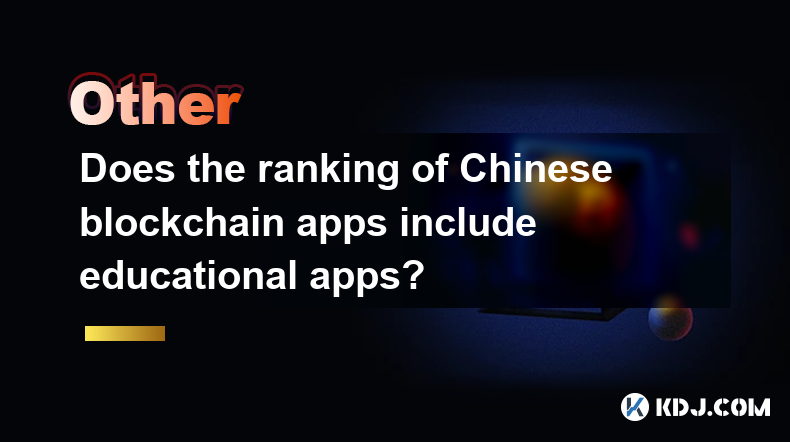
Does the ranking of Chinese blockchain apps include educational apps?
Apr 16,2025 at 03:35am
The ranking of Chinese blockchain apps often includes a variety of categories, from finance and gaming to social networking and beyond. One question that frequently arises is whether these rankings include educational apps. To address this, we need to delve into the specifics of how blockchain apps are categorized and ranked in China, and whether educat...
Does the ranking of Chinese blockchain apps include enterprise-level applications?
Apr 15,2025 at 06:42am
The ranking of Chinese blockchain apps often includes a variety of applications, ranging from consumer-focused to enterprise-level solutions. Understanding the scope and criteria for these rankings is essential to determine if enterprise-level applications are included. This article delves into the specifics of how Chinese blockchain app rankings are co...

Can ICOs in the blockchain space still make money?
Apr 17,2025 at 08:29pm
The landscape of Initial Coin Offerings (ICOs) in the blockchain space has evolved significantly since their peak in 2017 and 2018. Despite the increased regulatory scrutiny and the rise of alternative fundraising methods like Security Token Offerings (STOs) and Initial Exchange Offerings (IEOs), ICOs can still be a viable way to raise funds and generat...

Can the application of blockchain in supply chain finance bring benefits?
Apr 15,2025 at 04:00pm
Can the application of blockchain in supply chain finance bring benefits? The integration of blockchain technology into supply chain finance has garnered significant attention in the cryptocurrency and financial sectors. This article explores how blockchain can potentially revolutionize supply chain finance, detailing its benefits and providing a compre...

Does the ranking of Chinese blockchain apps include cross-chain applications?
Apr 14,2025 at 04:00pm
The ranking of Chinese blockchain apps is a comprehensive evaluation that takes into account various aspects such as user base, transaction volume, and technological innovation. A pertinent question arises regarding whether these rankings include cross-chain applications. Cross-chain applications, which allow different blockchain networks to interact an...

Does the ranking of Chinese blockchain apps include DeFi applications?
Apr 15,2025 at 06:57am
The ranking of Chinese blockchain apps is a comprehensive list that showcases the most popular and influential applications within the cryptocurrency ecosystem. One question that often arises is whether these rankings include DeFi applications. To answer this, we need to delve into the specifics of how these rankings are compiled and what types of appli...

Does the ranking of Chinese blockchain apps include educational apps?
Apr 16,2025 at 03:35am
The ranking of Chinese blockchain apps often includes a variety of categories, from finance and gaming to social networking and beyond. One question that frequently arises is whether these rankings include educational apps. To address this, we need to delve into the specifics of how blockchain apps are categorized and ranked in China, and whether educat...

Does the ranking of Chinese blockchain apps include enterprise-level applications?
Apr 15,2025 at 06:42am
The ranking of Chinese blockchain apps often includes a variety of applications, ranging from consumer-focused to enterprise-level solutions. Understanding the scope and criteria for these rankings is essential to determine if enterprise-level applications are included. This article delves into the specifics of how Chinese blockchain app rankings are co...
See all articles























































































